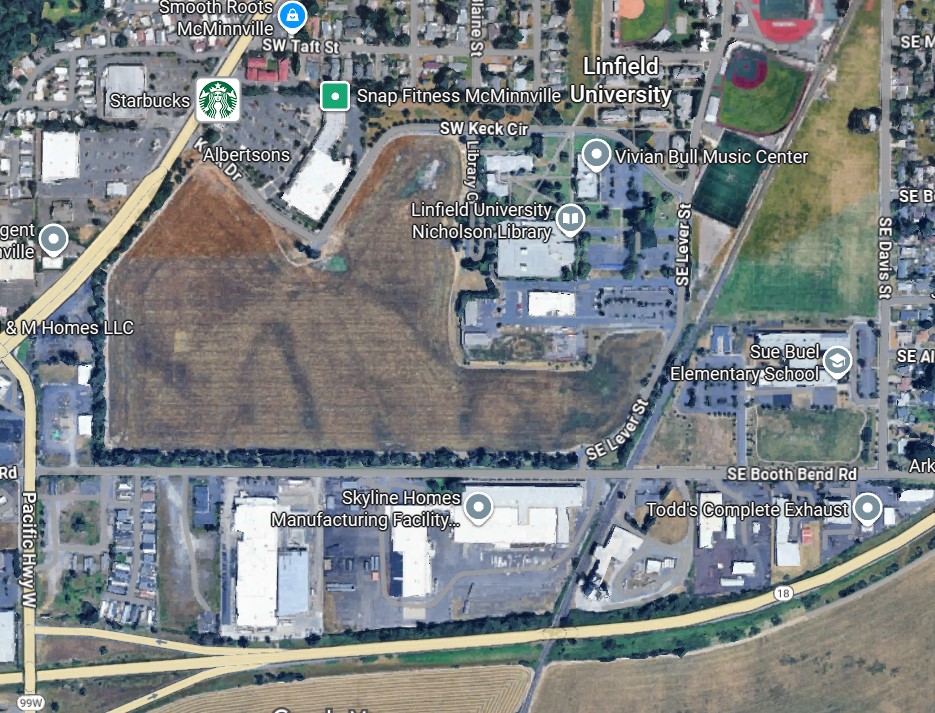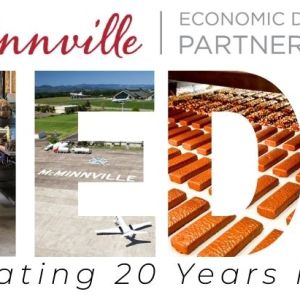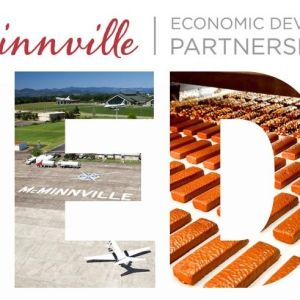

Written by Scott Unger. Reprinted with permission of the News-Register. Originally published Oct. 31, 2025.
Linfield University has contracted brokerage firm Apex Partners to assist with the development of 73 acres and is exploring a variety of options for the land zoned for commercial and residential.
Linfield is considering development options for a 40-acre parcel south of Albertsons and Keck Drive and north of Southwest Booth Bend Road and a 33-acre triangle-shaped parcel north of Sue Buel Elementary School between Davis Street and the railroad tracks.
The land was donated to Linfield by Hewlett Packard in 1996, and the university has been exploring options for over two years. It hired Leland Consulting last year for a visioning project; contracting Apex is the next step, according to Vice President for Finance and Administration Mike Wenz.
“The thought was, can we do something that activates the property, helps the community, both Linfield and McMinnville, and starts generating income, starts generating potentially synergistic uses for the university?” Wenz told the News-Register.
The university does not need the land for campus operations. It could sell portions or sign long-term ground leases or develop partnership projects, Wenz said.
“We are really not closing the door on anything,” he said.
Apex was brought in last month, and the brokerage firm will act as an intermediary between developers and the university. The first step is to issue a Request For Qualifications from interested developers, Wenz said.
“Through that process, I expect we’ll be able to identify some pool of developers that are serious and make sense as good partners,” he said.
Once that group is established, developers will be asked for formal proposals. Wenz expects much interest in short order, as developers have consistently asked about the parcels.
“I think we’ll get a pretty rapid response from some people who are willing to engage,” he said. “We have flat, essentially shovel-ready land in an area that’s already inside an Urban Growth Boundary in the middle of the Willamette Valley in McMinnville. So, it’s a really interesting opportunity, we think. And we’re pretty optimistic it’s going to generate a high level of interest.”
The development is likely to evolve in phases, Wenz said. The western parcel is mostly zoned C-3 general commercial, with a small area zoned R-4 residential. The eastern parcel is all R-4, which allows for a range of housing types including single-family, apartments and condominiums.
Portions of residential zone land will likely be sold, Wenz said.
“Some of it probably lends itself to sale. If the development community says, ‘we want to build single family homes,’ you don’t really ground lease for single family homes,” he said.
Ground leases are typically long-term and allow developers to alter property during the lease.
Linfield currently has a ground lease agreement with Albertsons that includes design standards and language limiting surrounding development options, according to Wenz.
The phased approach will allow the university to find partners for projects that make sense in proximity to higher education, Wenz said.
“At this point, it’s ours. We have a much higher level of control than we will once we turn it over to developer,” he said. “Even as much as you write design standards in there. And we’re looking for the right partner; we’re looking for the right development partner.”
A third option could be a partnership in which Linfield provides land as an equity stake and enters a joint venture with a developer.
“When we set out to do this, we had sort of three priorities,” he said. “One was to do something that makes good financial sense. One was to make sure that we have a good neighbor and good optionality for what we do in the future … and then lastly, if we can find any kind of synergistic uses, anything that complements what we’re doing at a university.”
That partnership could take the form of workforce housing for faculty and staff or a business that supports university offerings, such as a hotel and conference center to assist the wine studies program, Wenz said.
“We’d have our ears up for those kinds of opportunities.”
The process is in motion, with RFQ’s expected to be issued to developers later this year or early 2026, and proposals expected shortly after, Wenz said. Shovels could be in the ground before 2027.
“(Construction) depends on the projects,” he said. “I would not be at all surprised to see a shovel go in the ground in the next 12 to 24 months.”
The university envisions the finished product as a southern gateway into McMinnville and is excited to get it rolling, Wenz said.
“I think it’s just a really exciting opportunity for us,” he said. “It’s a really exciting opportunity for the community, and we appreciate all the engagements so far and look forward to moving this thing along.”








